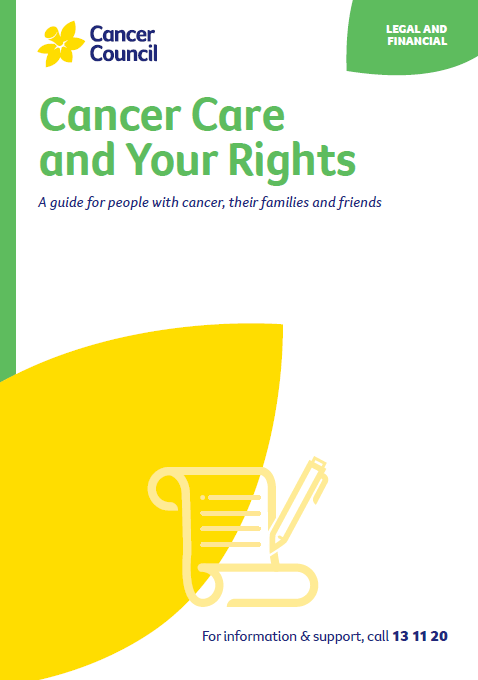- Home
- Cancer Information
- Practical concerns
- Cancer care and your rights
- Making treatment decisions
- Advance care planning
Advance care planning
Advance care planning involves thinking about your future health care and discussing your treatment goals and preferences for care with your family, friends and treatment team. This helps them to understand your goals, values and beliefs, and ensures that your wishes are respected if you lose the capacity to make your own decisions.
Advance care planning can be started at any stage, whether you are feeling well or ill. Everyone has their own preferences for medical care and these can change over time. As part of advance care planning, you may record your wishes in an advance care directive and appoint a substitute decision-maker.
Learn more about:
Advance care directive
The written record of your health care wishes may be called an advance care directive, an advance care plan or a living will. This includes details of your values, life goals and treatment preferences for doctors, family members and carers to consider if you become unable to communicate or make decisions.
You may include details of treatments that you would have or refuse to have, as well as outcomes that you don’t want and your preferences for end-of-life care. If your needs change, you can revise or cancel your advance care directive.
You can ask your doctor or hospital to place your advance care directive on your medical record. You can also save it online at My Health Record.
Substitute decision-maker
You can legally appoint someone to make decisions for you if at some point in the future you lose the capacity to make decisions yourself. This can include decisions about your finances, property and medical care. A substitute decision-maker should be someone you trust who understands your values and your wishes for future care.
Depending on where you live, the documents for appointing this person may be known as an enduring power of attorney, enduring power of guardianship or appointment of a medical treatment decision-maker.
Default decision-maker
If you lose capacity to give consent for medical treatment and you don’t have an advance care directive or a substitute decision-maker, the law in each state and territory outlines who may make medical treatment decisions for you. This is usually someone close to you, such as your spouse or partner, family member or close friend. For more information, visit End of Life Law in Australia.
Voluntary assisted dying
Voluntary assisted dying is when a person with an incurable, life-limiting condition or illness chooses to end their life with the assistance of a doctor or a health practitioner – using specially prescribed medicines from a doctor.
VAD laws have now commenced operation in all states of Australia. VAD remains illegal in the Australian Capital Territory and Northern Territory, although the laws are under review. For information and updates on VAD for your state or territory, visit Queensland University of Technology’s End of Life Law in Australia website.
VAD may be an option for some people who meet all the strict conditions and follow certain steps as required by the laws in their state. “Voluntary” means that it is the choice of the unwell person to end their life. Someone else cannot ask for VAD on your behalf or pressure you to ask for it; only you can ask for it and you must have decision-making capacity.
For more details about voluntary assisted dying in NSW, visit NSW Health or call the NSW Voluntary Assisted Dying Care Navigator Service on 1300 802 133.
→ READ MORE: Protecting your health information
Podcast: Coping with a cancer diagnosis
Listen to more of our podcast for people affected by cancer
More resources
Prof Sarah Lewis, Faculty of Medicine and Health, The University of Sydney, NSW; Kevin Bloom, Senior Social Worker, Haematology and Bone Marrow Transplant, Royal North Shore Hospital, NSW; Danielle Curnoe, Consumer; Alana Fitzgibbon, Clinical Nurse Consultant – Gastro-Intestinal Cancers, Cancer Services, Royal Hobart Hospital, TAS; Hall & Wilcox (law firm); Johanna Jordaan, Consumer; Dr Deme Karikios, Medical Oncologist, Nepean Cancer and Wellness Centre, Nepean Hospital, NSW; Melissa Lawrie, Breast Cancer Clinical Nurse, Cancer Services, Gold Coast Hospital and Health Service, QLD; Jacqueline Lesage, Consumer Reviewer, Cancer Voices NSW; McCabe Centre for Law and Cancer, VIC; Louise Pellerade, 13 11 20 Consultant, Cancer Council WA; Andrew Potter, Consumer; Siân Slade, PhD Candidate, Nossal Institute for Global Health and Non-Executive Director (health, disability sectors), VIC; Paula Watt, Clinical Psychologist, WOMEN Centre, WA.
View the Cancer Council NSW editorial policy.
View all publications or call 13 11 20 for free printed copies.
Need to talk?
Support services
Coping with cancer?
Speak to a health professional or to someone who has been there, or find a support group or forum
Looking for transport, accommodation or home help?
Practical advice and support during and after treatment
Cancer information
Dealing with the diagnosis
Common reactions to a cancer diagnosis and how to find hope
Cancer, work and you
Learn how cancer and its treatment can affect your work life, and how to manage this

